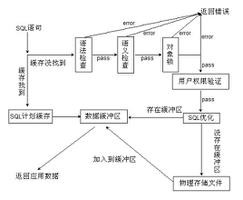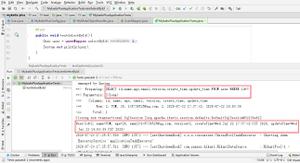驱动IO模型select

新人学习,欢迎指正
selectc代码">部分select.c代码
应用层select(maxfd+1,&rfds,NULL,NULL,NULL);
-------------------(系统调用)------------------------------
kernel-3.4.39/arch/arm/kernel$ vi calls.S
//系统调用相关的汇编文件
CALL(sys_select)
VFS:vi -t sys_select
->SYSCALL_DEFINE5宏,5代表有五个参数,替换得到sys_select
SYSCALL_DEFINE5(select, int, n, fd_set __user *, inp,
fd_set __user *, outp,fd_set __user *, exp,
struct timeval __user *, tvp)
->
#define SYSCALL_DEFINE5(select, ...)
SYSCALL_DEFINEx(5, _select, __VA_ARGS__)
->
#define SYSCALL_DEFINEx(x,_select, ...)
__SYSCALL_DEFINEx(x, _select, __VA_ARGS__)
->
#define __SYSCALL_DEFINEx(x, _select, ...)
long sys_select(int n, fd_set __user * inp,
fd_set __user *outp,fd_set __user *exp,
struct timeval __user * tvp)
{
ret = core_sys_select(n, inp, outp, exp, to);
}
--------------------------------------------------------------
core_sys_select(n, inp, outp, exp, to);
//1.校验最大的文件描述符
struct fdtable *fdt;
fdt = files_fdtable(current->files);
max_fds = fdt->max_fds;
if (n > max_fds)
n = max_fds;
//2.分配文件描述符的内存
bits = kmalloc(6 * size, GFP_KERNEL);
fds.in = bits;
fds.out = bits + size;
fds.ex = bits + 2*size;
//在内核空间分配的读表,写表,其他表的首地址
fds.res_in = bits + 3*size;
fds.res_out = bits + 4*size;
fds.res_ex = bits + 5*size;
//在内核空间分配的准备好的读表,写表,其他表的首地址
//3.将用户空间的读表,写表,其他的表拷贝到内核空间
if ((ret = get_fd_set(n, inp, fds.in)) ===>copy_from_user
(ret = get_fd_set(n, outp, fds.out))
(ret = get_fd_set(n, exp, fds.ex)))
//4.文件描述符的检查,如果所有的文件描述符的数据
都没有准备好,进程休眠,否则将准备好的文件描
述符放入到fds.res_in,fds.res_out,fds.res_ex
ret = do_select(n, &fds, end_time);
//5.判断是否是信号唤醒的进程
ret = -ERESTARTNOHAND;
if (signal_pending(current))
goto out; ====>信号唤醒的就跳过拷贝
ret = 0;
//6.如果不是信号唤醒的休眠,将文件描述符拷贝到用户空间
if (set_fd_set(n, inp, fds.res_in) ||
set_fd_set(n, outp, fds.res_out) || ====>copy_to_user
set_fd_set(n, exp, fds.res_ex))
ret = -EFAULT;
---------------------------------------------------------------------
驱动:
unsigned int (*poll) (struct file *file,
struct poll_table_struct *wait);
部分do_select代码
int do_select(int n, fd_set_bits *fds, struct timespec *end_time){
struct poll_wqueues table;
poll_table *wait;
int retval, i;
unsigned long slack = 0;
retval = max_select_fd(n, fds);
//通过文件描述符表中的对应的被设置
//为1的位来校验最大的文件描述符的值
n = retval;
//将校验完的文件描述符赋值给n
poll_initwait(&table);
//poll相关结构体的初始化
//只需要关心函数指针的初始化过程就行了
//函数指针,执行的是__pollwait
//在__pollwait会拿到你提交的等待队列头,然后
//在等待队列头后面添加当前进程的等待队列项
retval = 0;
//retval是用来判断是否需要退出文件描述符遍历
//的循环的。
for (;;)
{
unsigned long *rinp, *routp, *rexp, *inp, *outp, *exp;
inp = fds->in;
outp = fds->out;
exp = fds->ex;
rinp = fds->res_in;
routp = fds->res_out;
rexp = fds->res_ex;
//定义6个指针,将结构体中的6个指针
//赋值给这6个指针变量
for (i = 0; i < n; ++rinp, ++routp, ++rexp)
{
//用来取第几个unsigned long类型的数据
unsigned long in, out, ex, all_bits, bit = 1, mask, j;
unsigned long res_in = 0, res_out = 0, res_ex = 0;
const struct file_operations *f_op = NULL;
struct file *file = NULL;
in = *inp++;
out = *outp++;
ex = *exp++;
all_bits = in | out | ex;
if (all_bits == 0)
{
i += BITS_PER_LONG;
continue;
}
for (j = 0; j < BITS_PER_LONG; ++j, ++i, bit <<= 1)
{
//用来unsigned long类型中的第几位的
file = fget_light(i, &fput_needed);
//这里的i就是获取到的文件描述符,fget_light
//通过文件描述符找到file结构体
//fd->fd_array[fd]->struct file
//POLLIN
if (file)
{
f_op = file->f_op;
if (f_op && f_op->poll)
{
mask = (*f_op->poll)(file, wait);
}
//如果file存在,并且fops存在,并且fops中的
//poll函数存在,就调用这个存在的poll函数
//就会得到mask
if ((mask & POLLIN_SET) && (in & bit))
{
res_in |= bit;
//将当前的文件描述符放到
//要返回的文件描述符表中
retval++;
}
if ((mask & POLLOUT_SET) && (out & bit))
{
res_out |= bit;
retval++;
}
if ((mask & POLLEX_SET) && (ex & bit))
{
res_ex |= bit;
retval++;
}
//如果mask中的POLLIN/POLLOUT/POLLEX被置位了
//将这些文件描述符放到准备好的文件描述表中
//并且将retval这个变量加1,只要retval不为0,
//死循环就会被退出
}
}
}
if (retval || timed_out || signal_pending(current))
break;
//如果retval不为0,或者超时时间到了或者信号到来了
//这个死循环就会被退出
if (!poll_schedule_timeout(&table, TASK_INTERRUPTIBLE,
to, slack))
//如果上述的条件都不满足,循环没有退出,进程
//就进入休眠状态
}
return retval;
}
}
以上是 驱动IO模型select 的全部内容, 来源链接: utcz.com/z/519702.html






